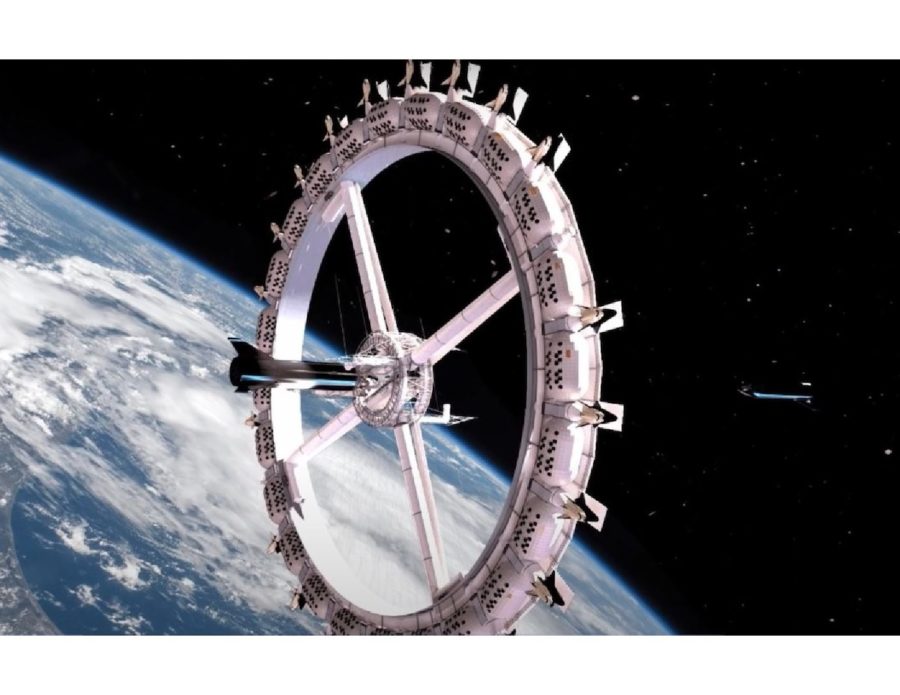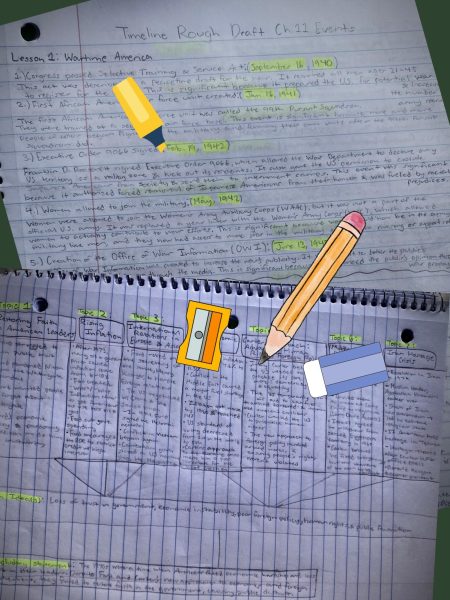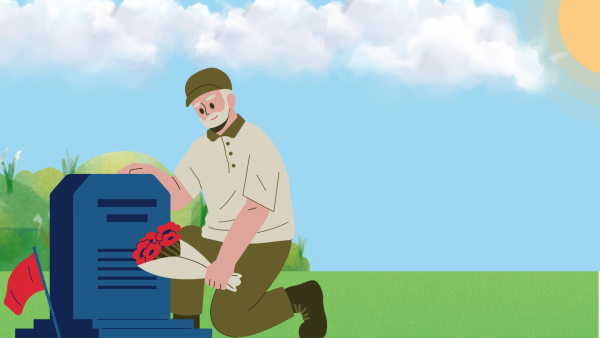The future is here: The Voyager Space Station Hotel is due to open in 2027
This is a mock-up of what the expected Voyager Space Station Hotel might look like, spinning in space.
The year is 2027 and you just woke up to see Earth from your window. It may have cost 5 million dollars but it is worth every penny. The first space hotel is due to open very soon.
Orbital Assembly Corporation is making this a reality. OAC has announced that they will start the construction in 2025.
The Voyager Space Station Hotel is going to be ring-shaped and have pods attached to the outside of it as the rooms.
Kimberly Sprafka, an 8th grade science teacher from Santiago K-8 in Santa Ana weighed in on this.
Sprafka said, “If I were younger, the prospect of traveling in space would be more appealing. At my stage of life, I would be more comfortable staying on Earth.”
She said she had heard rumors about a space hotel being in the works but she didn’t hear any solid details until after watching a CNN segment.
“I think it’s great anytime science allows people to learn about science and/or have new experiences with science.”
Although this sounds exciting there are still issues we need to think about.
Sprafka said, “My first concern would be safety of course. I would be curious to know the evacuation plan should something go wrong. Another concern would involve equitability. I imagine that the cost involved in traveling to and checking into the hotel would make it impossible for all but the uber rich to share in the space hotel experience.”
The space hotel will create its own gravity. This is referred to as “microgravity.” In microgravity, your body can move around in ways that it can’t here on Earth.
She said, “I think it would be fun to jump on a trampoline in microgravity.”
Sprafka wouldn’t want to go to space right yet because “there are still too many unknowns.”
When asked about how she feels about the idea of space travel she said, “I don’t think I’d ever be comfortable traveling in space. Even after working on a boat for four years, I’m still quite prone to motion sickness. “
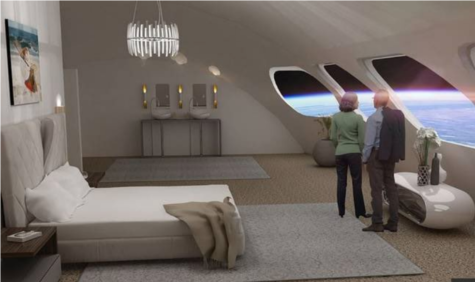
Traveling in space would feel different for those of us used to only being on Earth.
“Each individual would experience a different level of comfort or lack thereof,” said Sprafka.
This kind of advancement in science is not only good for science, it’s good for business.
She said, “If the hotel gets up and running and is able to keep its guests safe and comfortable, I believe it will lead to an influx of investment into more space hotels and space travel experiences. The money invested would lead to increased knowledge about space and how organisms adapt to living in low or microgravity environments. It would also lead to more advancements in technology as companies complete for guest bookings.”
Sprafka described this as a “small step” to moving to other planets.
This may be a small step but there are “so many different issues when considering the colonization of another planet.”
Sprafka said that there are numerous problems but the “two major initial problems” are “maintaining comfortable temperatures and breathing environments.”
She said that “before any colonization could be successful” we would need to establish proper food and water sources along with providing medical facilities. Sprafka said, “Dealing with trash and waste products are the other vital problems that immediately come to mind. The extended travel time required to reach another planet is yet another roadblock.”
Sprafka thought about possible solutions but we have yet to hear what is going to actually take place.
Sprafka thought it was important to mention that we live in the “Goldilocks Zone.” This means that our planet is “in just the right spot in our solar system.”
Because of this our planet is not too cold and not too hot. She said, “It allows liquid water to exist.” We are also protected by our atmosphere.
Sprafka brought this up because we are the only ones with an environment like this.
She said, “When humans leave the planet, there are many challenges to consider in order to ensure survival in space.”
Angela Kramer, a 7th grade science teacher also from Santiago, is going to “give it some time” before she makes a decision on going.
Kramer has heard about this before. She said, “It makes me feel that we are more advanced than what I thought because having this become a reality is literally around the corner.”
If in microgravity, Kramer said she would “move around in ways I couldn’t hear on Earth.”
According to The Sun, a UK news company, the space hotel is going to have a gym with basketball courts. This is going to be exciting because you can jump higher. This makes it easier to dunk the ball. The gym will also have other activities that will be fun to do in microgravity.
Kramer said, “Our muscles, bones, and joints are used to gravity pushing on them and without gravity in space over a period of time they will start to lose muscle mass that can affect them when they get back to earth.”
Kramer then proposed important questions, “What if something were to break down? Would people have to sign liability forms?”
It would make sense having to sign liability forms before going into space. Even though this is intriguing and exciting, there are still things that can go wrong unexpectedly.
Kramer says that she is “proud that we are advanced but concerned because I just don’t want anyone to get hurt.”
So far, the tickets are very expensive.
Mental Floss wrote an article called “You Can Now Book a Stay at the World’s First Space Hotel.” This article says that a 12-day trip costs $9.5 million per person and the first four months are already sold out.
It is said that overtime tickets will become less expensive. They will eventually become similar to a cruise-ship ticket.
Kramer would be interested in going at that point.
Kramer said, “In the future I think I would go about once every two to three years but I’d bring someone with me that has never experienced it before.”
When asked if this was a step closer to moving to other planets Kramer said, “I believe it will take a while to get there but I’m sure if you asked someone 100 years ago if they thought there would ever be a space hotel they probably thought that would never happen but look at us now.”
Clifford Gerstman who has taught space science and astronomy and currently teaches physics and robotics, keeps up with NASA. He knew about this before being interviewed.
Gerstman says that going to space is the last item on his unofficial bucket list.
Gerstman said, “The simple answer is that I would love to go into space. What I don’t need is to go to the Moon or to Mars. Low Earth orbit will be fine for me. This is where the space shuttle goes to.”
When asked about what he feels about this advancement Gerstman said, “It pleases me. For many years after we landed and began to work on the moon, we simply stopped exploring space. Worse than that, we stopped trying to inspire young people to head into a space-based career. If we ever make it to the asteroid belt to explore and mine minerals, we will find plenty of resources for building anything we can think of. That will never happen if we don’t keep working towards it.”
Gerstman has been in zero gravity before. On October 8, 2007, he escaped a straitjacket in zero gravity on SOFIA. He said, “If I did go into space, repeating my world record, but on film, would be a priority.”
Gerstman thinks we should be traveling in space. He said, “The first group of human Mars explorers has already been picked and they are ready to go. I may not get to go with them, but I am looking forward to watching them land and explore. From there we move out further and further,” said Gerstman.
He would not risk dying for this experience.
He said, “The space shuttle flew 135 missions and two of them ended in complete destruction of the ship and fatality to the crew. In simple terms that is two out of 135. If those seem like good odds, I suppose they are. That is about a 1.5% failure rate. On the other hand, look at commercial airlines. I love to fly and have flown many times for various reasons. A commercial plane will crash once for every 10 million or so flights. You see plane crashes do happen, but so rarely that it is not worth worrying about as you get onboard. The space flight record will have to be a bit better before I go up there.”
If it gets safer, Gerstman thinks going one time will be enough for him. He said, “Here is the thing, if you go to the Space Hotel, what will you do there? You can spend a few hours looking out the window, and see all of Earth going by. In the book “Riding Rockets,” space shuttle astronaut Mike Mullane talks about the view of the Earth passing at high speed below. He also mentions how easy it is to get “space sick” from that view. Beyond the thrill of the trip there and back, there is not much else to do. They may have some activities taking advantage of microgravity, but that will lose its novelty very quickly. Then it is just a small room in a hotel.”
Since the hotel will be creating its own gravity, Gerstman explained how they would do this. He said, “This has been studied long and hard by NASA, and has been represented in several sci-fi TV shows and movies. The simple answer is to replace the ‘force of gravity’ which is ‘weight’ with centripetal force, or the force of circular motion. By making the ship, or parts of the ship spin at a specific rate, you can more or less approximate gravity. If you think of a ship’s living quarters as being shaped like a donut, the inside of the donut would be the area where the engines and equipment would be and the outside of the donut would be living areas. The forces would make the outside ring to be ‘down’ and so you would feel that away from the ship, was ‘down,’ while toward the center of the ship was ‘up.’ Anyone who takes my physics class will learn all about this near the end of the year.”
Even though this is exciting news we have to keep in mind that this won’t be open until 2027. The first few months are the most expensive and are already booked completely. After that who knows what will happen?
As Sprafka said, “There are still too many unknowns.”
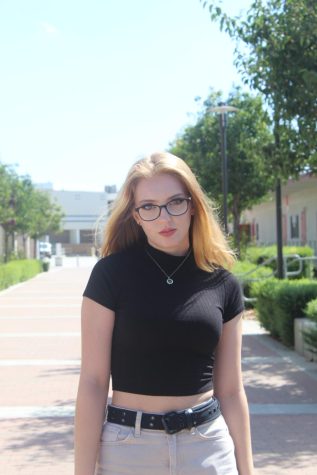
I have 4 cats, I’ve met Kill Bill:The Rapper, and I’ve seen Billy Joel in Vegas
































